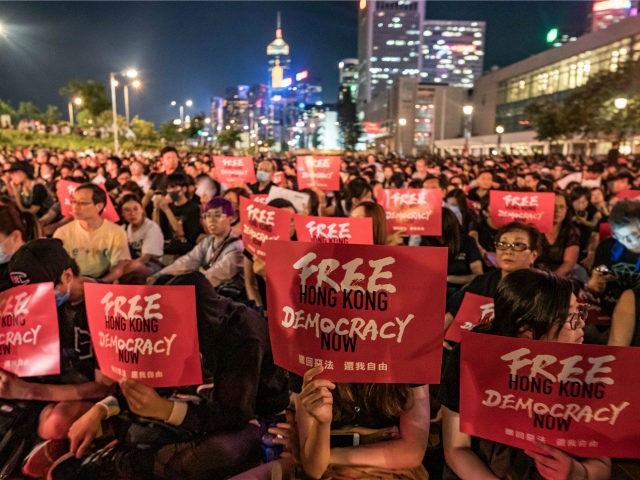Pro-democracy protesters in Hong Kong stood between the doors of Mass Transit Rail (MTR) trains in the city on Tuesday morning, preventing them from moving and keeping locals from getting to work during peak transit hours.
The protesters apologized profusely to angry commuters and some bystanders helped pay for cabs and alternative transportation to those affected. The protest is meant to condemn the inaction of MTR officials during a violent mob attack on peaceful protesters two weeks ago in Yuen Long, a northern rural part of the Hong Kong autonomous region.
The chaos on MTR train platforms Tuesday morning occurred amid growing reports of discontent among MTR workers who reportedly feel the government has not done enough to protect them from violence or from public outrage following the violence in Yuen Long.
A protest in Yuen Long against the Chinese-controlled local government this month attracted thousands and ended peacefully. When the protesters began making their way to the Yuen Long MTR station, a mob of an estimated 100 white-clad thugs surrounded the unarmed protesters, beating them with metal rods and bamboo sticks. Some of the worst assaults occurred on MTR trains, where protesters were cornered. Other major violent acts occurred on MTR platforms after a train conductor demanded everyone exit the train, leaving protesters with nowhere to hide.
The Hong Kong Free Press (HKFP), reporting on the ground in the city since the protest movement erupted in June, reported that protesters began their action at 7:50 a.m. local time, interrupting the flow of commuter traffic during the most crowded time for the MTR in the morning at multiple platforms throughout the city center. They stood in between the train doors, making it impossible for the trains to move, for nearly two hours.
Several individuals seeking to go to work erupted at the protesters, yelling at them to move and urging them to protest in a manner that did not disturb them. The protesters reportedly apologized to many of them. On one occasion, the HKFP reported that a group of people collected money to ensure that one particularly agitated woman got to work on time through another means.
Those who were protesting were doing so because they could afford it, a man the HKFP identified as “Mr. Li” told the outlet. He helped collect cab fare for the woman fearing not being able to make it to work.
The HKFP published a flyer that the protesters were reportedly handing out apologizing to commuters.
“Will you give us a minute of your time to hear us out?” the flyer asked. “We’re very sorry for keeping you from getting to work, we simply don’t have many options.”
The flyer listed the protesters’ demands as a withdrawal of the extradition bill that triggered the protest movement, a government apology for calling the peaceful protests “riots,” freedom for political prisoners arrested for opposing the extradition bill, an independent inquiry on police brutality, and “universal suffrage.”
“We invite you to take a day off” to minimize inconvenience for third parties, the flyer added.
Hong Kong’s Legislative Council (LegCo) introduced a bill this year that, if passed, would have allowed China to extradite into communist prisons any individual present in Hong Kong accused of violating communist law. Protesters condemned the bill as violating “One Country, Two Systems,” the policy China agreed to during the 1997 handover from the U.K. that allows Hong Kong to live under capitalism. The largest protest so far against the bill occurred immediately after LegCo tabled it, claiming they would not pass it but refusing to fully withdraw the bill from consideration. A lawmaker can revive a tabled bill at any time. Two million of Hong Kong’s 7 million people took to the streets to demand a full withdrawal of the bill in mid-June.
MTR officials were ultimately forced to offer bus services due to the disturbance.
The Communist Party Global Times publication accused protesters of being “willing to hold the city’s livelihood hostage in pursuit of their ill-intentioned political goals.” The newspaper also accused protesters of berating commuters who shouted at them to let them use the trains. The Global Times notably lamented that many commuters did not express outrage at the protesters, however.
“The exchange highlighted a serious problem in the violent protests over the past few weeks: many ordinary Hong Kong residents are reluctant to stand up to the radical protesters,” the Chinese government publication claimed.
The Hong Kong-based South China Morning Post noted this week that the protests come on the heels of reports of “imminent strike action” on the part of MTR workers outraged at the lack of support from the executives who run the public service.
While a strike did not occur on Tuesday morning, the SCMP reported that “the rail operator’s frontline staff expressed outrage at its handling of the passengers who were beaten last weekend in Yuen Long, and there were calls online for a strike by drivers starting at 7am on Tuesday.” The frontline staff, the newspaper claimed, were infuriated that corporate MTR leaders did not make enough of an effort to redirect public outrage away from a train driver who shut the doors on protesters in Yuen Long on the night that the triad-linked thugs attacked them. The SCMP claims that “about 1,000” MTR workers have written angry letters to the executives running the MTR for insufficiently explaining that the conductor in question was following protocol and that train operators were insufficiently trained to handle violent situations.
MTR management has reportedly promised to review its safety protocols. Union leaders also told the SCMP that, despite the widespread online outrage, union leaders were not calling for any strikes.

COMMENTS
Please let us know if you're having issues with commenting.